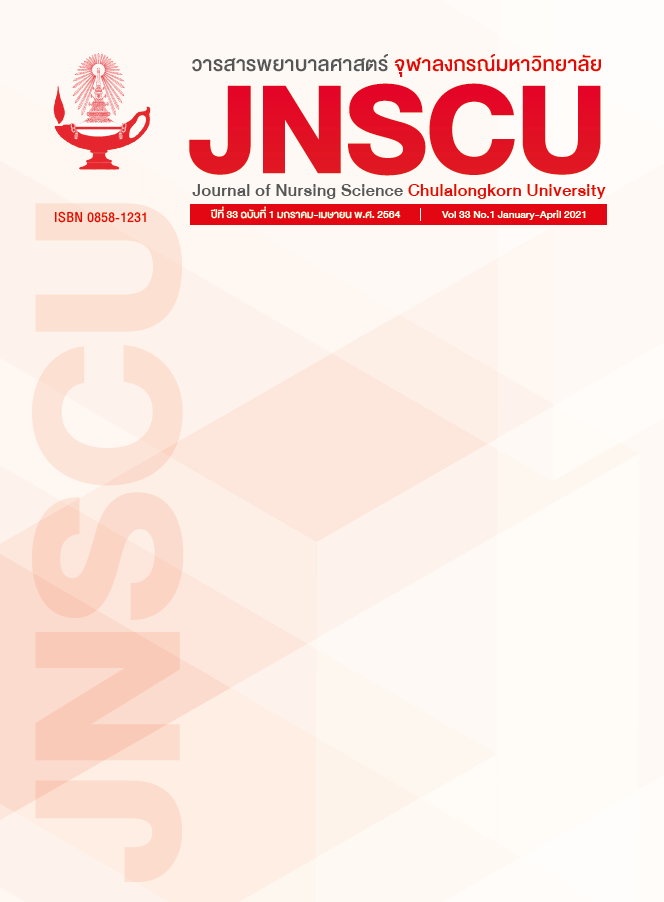ผลของการใช้สิ่งแวดล้อมบำบัดต่อพฤติกรรมก้าวร้าวของ เด็กออทิสติกวัยเรียนอาการรุนแรง
คำสำคัญ:
สิ่งแวดล้อมบำบัด, เด็กออทิสติกอาการรุนแรง, พฤติกรรมก้าวร้าวบทคัดย่อ
วัตถุประสงค์: เพื่อเปรียบเทียบพฤติกรรมก้าวร้าวของเด็กออทิสติกวัยเรียนอาการรุนแรงก่อนและหลังได้รับการใช้สิ่งแวดล้อมบำบัด และเปรียบเทียบพฤติกรรมก้าวร้าวของเด็กออทิสติกวัยเรียนอาการรุนแรงระหว่างกลุ่มที่ได้รับการใช้สิ่งแวดล้อมบำบัดกับกลุ่มที่ได้รับการพยาบาลตามปกติ
รูปแบบการวิจัย: การวิจัยกึ่งทดลอง
วิธีดำเนินการวิจัย: กลุ่มตัวอย่าง คือ เด็กออทิสติกที่อาการรุนแรง อายุ 6-12 ปี และผู้ดูแลหลักที่มารับบริการแผนกผู้ป่วยใน สถาบันราชานุกูล ซึ่งมีคุณสมบัติตามเกณฑ์ โดยได้รับการจับคู่ (Matched pair) และการสุ่มเข้ากลุ่มทดลองและกลุ่มควบคุม จำนวนกลุ่มละ 18 คู่ กลุ่มทดลองเข้าร่วมโปรแกรมการใช้สิ่งแวดล้อมบำบัดระยะเวลา 4 สัปดาห์ ส่วนกลุ่มควบคุมได้รับการพยาบาลตามปกติ เครื่องมือที่ใช้ในการทดลอง คือ 1) แบบสอบถามข้อมูลส่วนบุคคลของเด็กออทิสติกและผู้ดูแลหลัก 2) แบบประเมินพฤติกรรมก้าวร้าวเด็กออทิสติก 3) แนวทางปฏิบัติการพยาบาลโดยใช้สิ่งแวดล้อมบำบัดสำหรับเด็กออทิสติกวัยเรียนอาการรุนแรง 4) คู่มือการใช้สิ่งแวดล้อมบำบัดสำหรับเด็กออทิสติกวัยเรียนอาการรุนแรงสำหรับผู้ดูแล และ 5) แบบประเมินความสามารถการจัดการพฤติกรรมก้าวร้าวเด็กออทิสติกวัยเรียนอาการรุนแรงที่บ้านสำหรับผู้ดูแลหลัก เครื่องมือทุกฉบับได้รับการตรวจสอบความตรงตามเนื้อหาโดยผู้ทรงคุณวุฒิจำนวน 5 ท่าน และได้ค่าความเที่ยงแบบประเมินพฤติกรรมก้าวร้าวเท่ากับ .87 วิเคราะห์ข้อมูลโดยใช้สถิติทดสอบที (t-test)
ผลการวิจัย: 1) พฤติกรรมก้าวร้าวของเด็กออทิสติกวัยเรียนอาการรุนแรงหลังการได้รับการใช้สิ่งแวดล้อมบำบัดลดลงกว่าก่อนได้รับการบำบัดอย่างมีนัยสำคัญทางสถิติที่ระดับ .05 และ 2) พฤติกรรมก้าวร้าวของเด็กออทิสติกวัยเรียนอาการรุนแรงกลุ่มที่ได้รับการใช้สิ่งแวดล้อมบำบัดลดลงกว่ากลุ่มที่ได้รับการพยาบาลตามปกติอย่างมีนัยสำคัญทางสถิติที่ระดับ .05
สรุป: การใช้สิ่งแวดล้อมบำบัดในการปฏิบัติการพยาบาลเด็กออทิสติกวัยเรียนที่มีอาการรุนแรง ส่งผลให้พฤติกรรมก้าวร้าวของเด็กลดลงได้
เอกสารอ้างอิง
Barbaresi WJ, Katusic SK, Voigt RG. Autism: a
review of the state of the science for
pediatric primary health care clinicians.
Archives of Pediatric and Adolescent
Medicine 2006; 160(11): 1167-75.
Ruangtrakul S. Textbook Children and
Adolescent. 2nd ed. Bangkok: Ruen Kaew
Printing House; 2008.
Carter AS, Black DO, Tewani S, Connolly CE,
Kadlec MB, Tager-Flusberg H. Sex
differences in toddlers with autism
spectrum disorders. Journal of autism
and developmental disorders 2007;
(1): 86-97.
Trangkasombat U. Helping an autistic child.
nd ed. Bangkok: Research and
Development Center Family; 2008
Rimland B, Edelson SM. Autism Treatment
Evaluation Checklist (ATEC) [internet].
[Cited 2020 June 22]. Available
from: https://psycnet.apa.org/doi
Landing? doi=10.1037%2Ft03995-000
Medical Statistics of Rajanukul Institute.
Annual Report. Bangkok: Rajanukul
Institute, 2018.
Yudofsky SC, Silver JM, Jackson W, Endicott J,
Williams D. The Overt Aggression Scale
for the objective rating of verbal and
physical aggression. The American
journal of psychiatry 1986; 143(1): 35-9.
Doi: 10.1176/ajp.143.1.35
Kloosterman PH, Kelley EA, Parker JD, Craig
WM. Executive functioning as a predictor
of peer victimization in adolescents with
and without an Autism Spectrum
Disorder. Research in autism spectrum
disorders 2014; 8(3): 244-54.
Kanne SM, Mazurek MO. Aggression in children
and adolescents with ASD: Prevalence
and risk factors. Journal of Autism and
Developmental Disorders 2011; 41(7):
-37.
Hill AP, Zuckerman KE, Hagen AD, Kriz DJ,
Duvall SW, Van Santen J, et al. Aggressive
behavior problems in children with
autism spectrum disorders: Prevalence
and correlates in a large clinical sample.
Research in Autism Spectrum Disorders
; 8(9): 1121-33.
Isaranarug S. Emotional and social development
of children aged 6-12 years.
Journal of Public Health and Development
; 4(2): 89-100. (in Thai).
Borge L, Rossberg JI, Sverdrup S. Cognitive
milieu therapy and physical activity:
experiences of mastery and learning
among patients with dual diagnosis.
Journal of Psychiatric and Mental Health
Nursing 2013; 20(10): 932-42.
Mancil GR, Conroy MA, Haydon TF. Effects
of a modified milieu therapy intervention
on the social communicative behaviors
of young children with autism spectrum
disorders. Journal of Autism and
Developmental Disorders 2009; 39(1):
-63.
Yungsantia C, Yunibhan J. A study of nursing
care emphasizing milieu therapy on
aggressive behaviors of mentally
retarded children, Rajanukul Institute
[Master’s thesis in Nursing Program].
Bangkok: Chulalongkorn University;
Pangpromma N, Yunibhan J, Upasaen R.
The effect of behavior therapy with
family involvement on aggressive
behaviors of autistic children [Master’s
thesis in Nursing Program]. Bangkok:
Chulalongkorn University; 2015.
Leelanuntakit T. Management of aggressive
and violent patients with the safety of
patients and care takers. Bangkok:
Thammasat Printing House; 1998. p. 167.
Nightingale F. Notes on Nursing. Philadelphia:
J.B. Lippincott; 1992.
Skinner BF. Science and human behavior.
New York: The Free Press; 1953.
Thongpetch A, Yunibhan J. The effect
of behavior therapy on aggressive
behaviors of autistic children, out
patient department [Master’s thesis in
Nursing Program]. Bangkok: Chulalongkorn
University; 2011.
ดาวน์โหลด
เผยแพร่แล้ว
ฉบับ
ประเภทบทความ
สัญญาอนุญาต

อนุญาตภายใต้เงื่อนไข Creative Commons Attribution-NonCommercial-NoDerivatives 4.0 International License.
##default.contextSettings.thaijo.licenseTerms##


